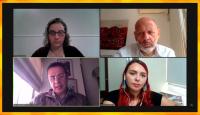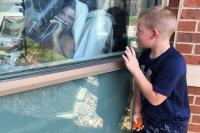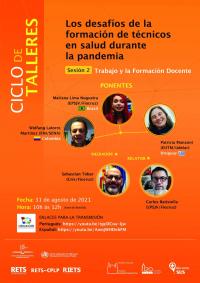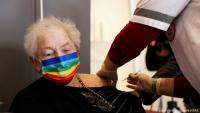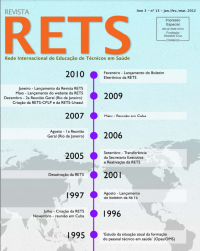You are here
News
-
09/09/2021 - The event, held on August 31 by EPSJV/Fiocruz, in cooperation with RETS and its sub-networks, had as discussants: Wolfang Alberto Latorre Martínez, from the National School of Instructors 'Rodolfo Martínez Tono', of the Servicio Nacional de Aprendizaje (ENI/SENA - Colombia); Mariana Lima Nogueira (EPSJV/Fiocruz - Brazil); and Patricia Manzoni, director of the University School of Medical Technology of the University of the Republic of Uruguay (EUTM/Udelar - Uruguay).
-
09/01/2021 - Millions of COVID patients still experience debilitating symptoms months after their infection. Many of them have to fight the additional battle of convincing their doctors or loved ones to take them seriously.
-
08/25/2021 - Pan American Health Organization (PAHO) Director Carissa F. Etienne said the severe shortage of COVID-19 vaccines in Latin America and the Caribbean is a “wake-up call” for increased regional production of vaccines and announced the start of a new platform to reach that goal. Director also reports that PAHO continues to distribute “much-needed medical supplies” in post-earthquake Haiti while the pandemic accelerates in many Central American and Caribbean countries.
-
08/20/2021 - Two studies now clarify why some people contracted coronavirus infection without experiencing problems while others fell ill to death. One of the studies points out that nearly 20% of deaths from covid-19 are due to the fact that patients produce a type of immune system protein that, far from protecting them against the virus, exacerbates its effects.Six percent of those over 80 years of age produce defective antibodies that worsen the disease.
-
08/19/2021 - The second session of the Cycle of Workshops 'The challenges of health technicians education during the pandemic', to be held on August 31st, from 10am to 12pm (Brasilia time), will address the theme of Work and Teacher Training. The idea is to present the theme and debate experiences, difficulties and strategies lived in the different institutions that make up the Networks. Wolfang Alberto Latorre Martínez, from the National School of Instructors 'Rodolfo Martínez Tono' (ENI/SENA - Colombia); Mariana Lima Nogueira, from EPSJV/Fiocruz - Brazil; and Patricia Manzoni, director of the University School of Medical Technology (EUTM/UDELAR - Uruguay) will participate as debaters in this workshop.
-
08/16/2021 - "Our region needs to pursue all possible avenues to expedite access and ensure countries reach their vaccination goals. We still need more donations; and we still need COVAX to deliver on its original commitment. We also need to create new opportunities that meet the diverse needs of our Member States, and that increase the supply of vaccines to the people and communities at greatest risk.” Carissa F. Etienne.
-
08/04/2021 - Rich nations should help poorer ones access COVID vaccines before giving booster shots to their own citizens, the WHO says. But the US has dismissed the idea. "WHO is calling for a moratorium on boosters until at least the end of September to enable at least 10% of the population of every country to be vaccinated,'' said Tedros Adhanom Ghebreyesus, WHO director.
-
07/28/2021 - Due to the COVID-19 pandemic, “more than 600 million children in countries not on academic break are still affected by school closures”, James Elder, UNICEF spokesperson at a press conference at UN Geneva. A culture of “safety, friends and food” at school has been replaced by “anxiety, violence, and teenage pregnancy”, with remote learning out of reach for millions.
-
07/16/2021 - Created in 1996, RETS is a link between institutions and organizations involved in the training and qualification of technical personnel in the health area in countries of Americas, Portuguese-speaking Africa, Asia, and Europa. Currently, the network brings together more than 100 institutions from more than 20 countries. It also hosts two subnetworks: the Network of Technical Health Schools of the Community of Portuguese Language Countries (RETS-CPLP) and the Ibero-American Network of Health Technician Education (RIETS).
-
07/09/2021 - In simulations made by the researchers, analyzing past measures and in an optimistic scenario, adopting the system could have avoided up to 64% of cases, hospitalizations, and deaths with better administration of the periods in which social distancing was enforced.

